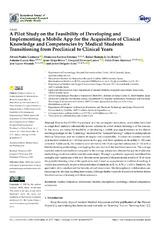Mostrar el registro sencillo del ítem
A Pilot Study on the Feasibility of Developing and Implementing a Mobile App for the Acquisition of Clinical Knowledge and Competencies by Medical Students Transitioning from Preclinical to Clinical Years
| dc.contributor.author | Prados-Carmona, Álvaro | |
| dc.contributor.author | Fuentes-Jiménez, Francisco J. | |
| dc.contributor.author | Román de los Reyes, Rafael | |
| dc.contributor.author | García-Ríos, Antonio | |
| dc.contributor.author | Rioja-Bravo, Jesús | |
| dc.contributor.author | Herruzo Gómez, Ezequiel | |
| dc.contributor.author | Pérez-Martinez, Pablo | |
| dc.contributor.author | López-Miranda, José | |
| dc.contributor.author | Delgado-Lista, Javier | |
| dc.date.accessioned | 2022-03-01T12:50:47Z | |
| dc.date.available | 2022-03-01T12:50:47Z | |
| dc.date.issued | 2022 | |
| dc.identifier.uri | http://hdl.handle.net/10396/22640 | |
| dc.description.abstract | Due to the COVID-19 pandemic and the consequent restrictions, universities have had to adapt their curricula substantially to new schemes in which remote learning is of the essence. In this study, we assess the feasibility of developing a mobile app supplementary to the distant teaching paradigm for the “Cardiology” module of the “General Pathology” subject in undergraduate Medical Education, and we evaluate its impact and acceptability. A cohort of volunteer second-year medical students (n = 44) had access to the app, and their opinions on its utility (1–10) were collected. Additionally, the students were invited to refer their expected satisfaction (1–10) with a blended learning methodology overlapping this new tool with the traditional resources. The average expected satisfaction had been compared to the average satisfaction obtained by just the traditional methodology in other modules from the same subject. Through a qualitative approach, we defined the strengths and weaknesses of the tool. Seventy-seven percent of the participants rated at 8/10 or more the potential learning value of the application and, if used as a supplement to traditional teaching, it would also statistically improve the satisfaction of students (6.52 vs. 8.70, p < 0.001). Similarly, the qualitative data corroborated the benefits of such innovation. Multidisciplinary collaborations are encouraged to develop teaching innovations, although further research should aim to better define the effectiveness of learning with these resources. | es_ES |
| dc.format.mimetype | application/pdf | es_ES |
| dc.language.iso | eng | es_ES |
| dc.publisher | MDPI | es_ES |
| dc.rights | https://creativecommons.org/licenses/by/4.0/ | es_ES |
| dc.source | International Journal of Environmental Research and Public Health 19(5), 2777 (2022) | es_ES |
| dc.subject | Medical education | es_ES |
| dc.subject | Educational models | es_ES |
| dc.subject | Smartphone | es_ES |
| dc.subject | Cardiology | es_ES |
| dc.subject | Clinical competence | es_ES |
| dc.subject | Satisfaction | es_ES |
| dc.title | A Pilot Study on the Feasibility of Developing and Implementing a Mobile App for the Acquisition of Clinical Knowledge and Competencies by Medical Students Transitioning from Preclinical to Clinical Years | es_ES |
| dc.type | info:eu-repo/semantics/article | es_ES |
| dc.relation.publisherversion | https://doi.org/10.3390/ijerph19052777 | es_ES |
| dc.rights.accessRights | info:eu-repo/semantics/openAccess | es_ES |

